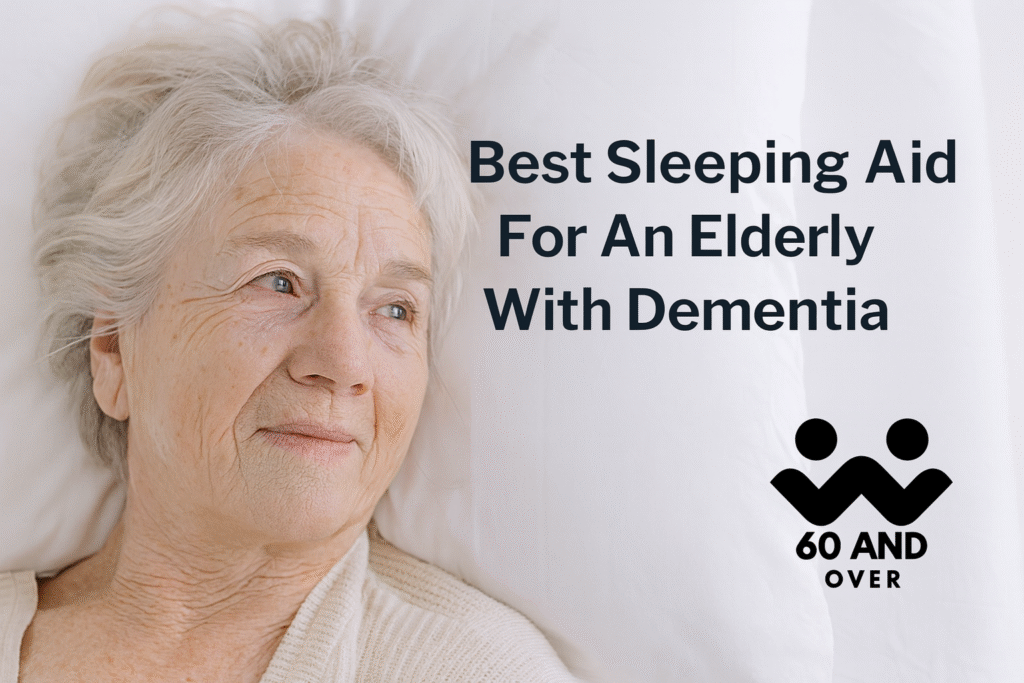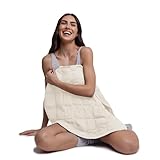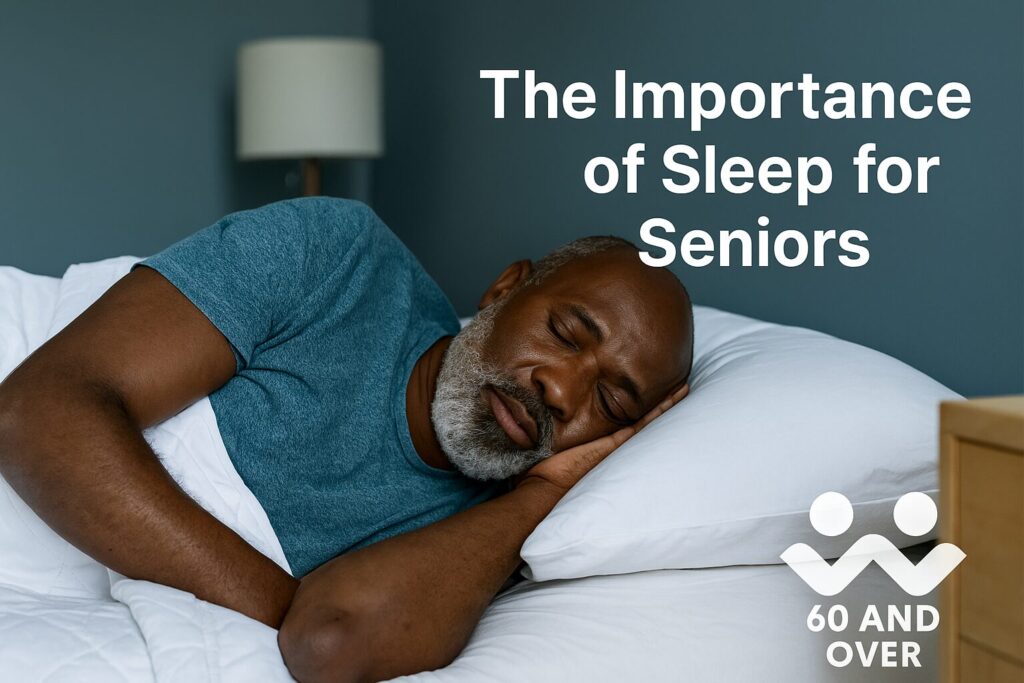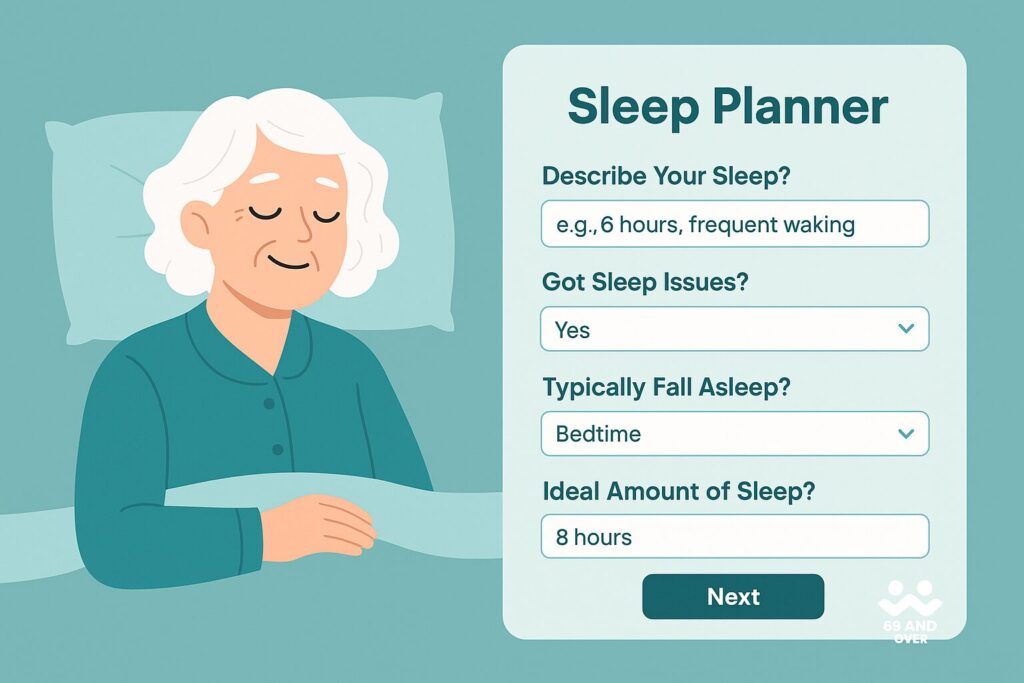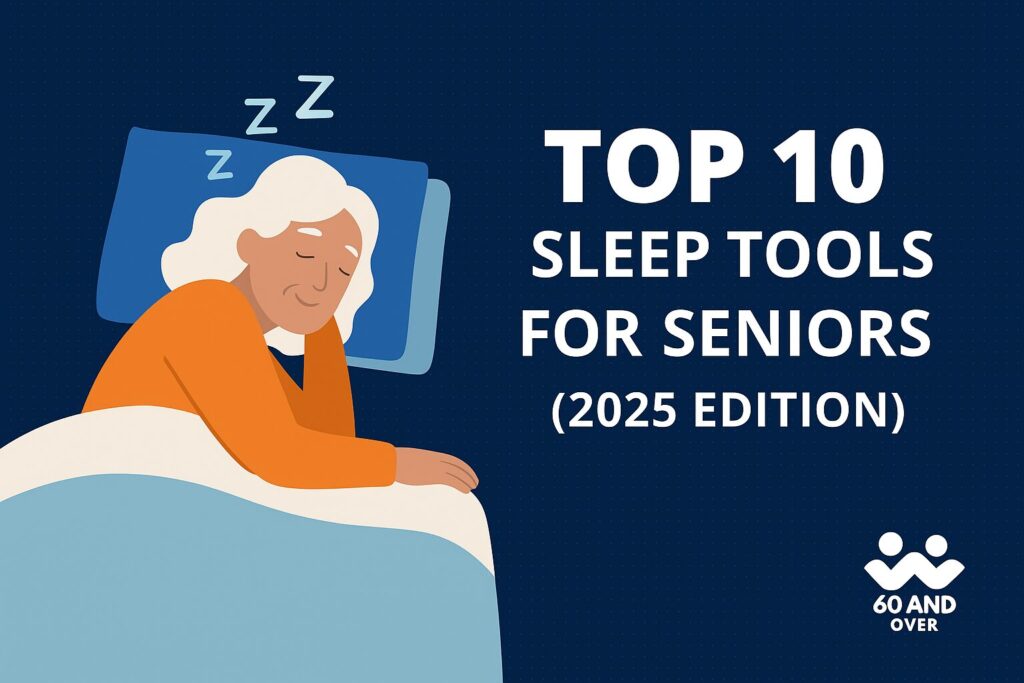Sleep problems are common in dementia. Many older adults have trouble falling asleep, wake frequently at night, or become restless and wander. These disruptions can affect not only the person living with dementia but also their caregivers.
The good news is that the most effective “sleeping aids” are often simple, safe steps that strengthen healthy routines and improve the bedroom environment. Medications may be considered in some cases, but they should always come after trying non-drug strategies and in close consultation with a healthcare provider.
Doctors sometimes prescribe sleep medications or supplements for dementia, but these should only be used under professional supervision because of the risks involved. The strategies below focus on safer, non-drug options that caregivers can try first.
First-Line Sleeping Aids: Non-Drug Strategies
1. Strengthen the body’s internal clock
Daily exposure to bright morning light, regular activity during the day, and consistent bedtimes are powerful natural sleep aids. Even a short walk outside in the morning or opening curtains to let sunlight in can help regulate the sleep–wake cycle.
2. Encourage movement and engagement
Gentle exercise, social interaction, and structured daytime activities reduce restlessness at night. Later in the day, begin winding down with calming cues—dim lighting, soft music, or reading aloud.
3. Optimize the sleep environment
Make the bedroom safe, cool, and quiet. Use nightlights to reduce fall risk, remove clutter, and add simple signs or contrasting colors to help the person find the bathroom easily.
4. Address underlying issues
Pain, frequent nighttime urination, sleep apnea, or side effects from medications can all fragment sleep. Discussing these problems with a clinician can often help more than adding a sedative.
Medication Options: What’s Safest and What to Avoid
If non-drug strategies don’t work and sleep difficulties remain severe or unsafe, a doctor may consider certain medications. Each option comes with benefits and risks.
Trazodone (low dose, off-label use)
A small clinical trial in people with Alzheimer’s disease found that trazodone helped increase total sleep time without major side effects. It is commonly prescribed because it is familiar and affordable, though it can still cause morning grogginess and dizziness.
Suvorexant (Belsomra)
This newer medication works by blocking the brain’s wakefulness signal. The FDA approved it for insomnia in adults, and studies have shown it may improve sleep in people with Alzheimer’s disease. The main risks are next-day sleepiness and, in rare cases, unusual sleep behaviors.
Melatonin
Though widely used, melatonin has shown mixed results in dementia. Some caregivers find it helpful, but research suggests the benefit may be limited. If used, it should be short-term and monitored closely.
What to avoid
Over-the-counter sleep aids containing antihistamines (like diphenhydramine or doxylamine), benzodiazepines, and “Z-drugs” such as zolpidem should be used with extreme caution—or avoided altogether. These medications can worsen confusion, increase fall risk, and trigger dangerous side effects in people with dementia.
Sleep Aids for Older Adults with Dementia — Comparison
Trazodone (off-label)Often considered
- Best For
- Frequent awakenings; fragmented sleep
- Typical Senior Start
- 25–50 mg at bedtime
- Evidence in Dementia
- Small randomized studies suggest increased total sleep time and sleep efficiency in Alzheimer’s.
- Common Effects
- Sleepiness, dry mouth, dizziness
- Major Cautions
- Orthostatic hypotension, falls; caution with other sedatives
- Caregiver Notes
- Start low, reassess weekly; add nightlights and clear paths to reduce fall risk.
Suvorexant (Belsomra)Evidence-supported
- Best For
- Difficulty staying asleep (wake after sleep onset)
- Typical Senior Start
- Per prescriber; lowest effective dose
- Evidence in Dementia
- Study in mild–moderate Alzheimer’s showed increased total sleep time and fewer awakenings.
- Common Effects
- Next-day drowsiness, abnormal dreams
- Major Cautions
- Rare complex sleep behaviors; avoid with strong CNS depressants
- Caregiver Notes
- Give at bedtime, monitor next-day alertness; keep a simple sleep log.
MelatoninMixed benefit
- Best For
- Circadian timing issues; early evening sleepiness / early waking
- Typical Senior Start
- 1–3 mg 1–2 hrs before bed (short trial)
- Evidence in Dementia
- Mixed findings overall; may help some individuals.
- Common Effects
- Headache, vivid dreams
- Major Cautions
- Possible interactions (e.g., anticoagulants); quality varies by brand
- Caregiver Notes
- Use only alongside routine + morning light; stop if no clear benefit.
OTC Antihistamines (diphenhydramine, doxylamine)Generally avoid
- Best For
- —
- Typical Senior Start
- Not recommended
- Evidence in Dementia
- No meaningful benefit; high anticholinergic burden.
- Common Effects
- Confusion, urinary retention, daytime sedation
- Major Cautions
- Delirium, falls, worsening cognition; on Beers Criteria list
- Caregiver Notes
- Avoid “PM” products; check labels on allergy/cold medications.
How to Use Sleep Aids Safely
Even when medications are used, they need to be approached with caution in older adults. A clear plan, frequent check-ins, and pairing with healthy routines can help avoid side effects and keep sleep strategies safe.
- Set a clear goal. Decide if the main issue is falling asleep, staying asleep, or preventing nighttime wandering.
- Start low, go slow. Doses should be minimal, with close monitoring for side effects.
- Pair with non-drug strategies. Medications should only be used alongside healthy routines, not as a replacement.
- Review regularly. If there is no improvement after a trial period, it may be time to stop.
A Practical Bedtime Plan You Can Try Tonight
Building a consistent bedtime routine often helps more than any pill. These simple daily habits create cues that prepare the body and mind for rest, while also reducing nighttime confusion and wandering.
- Morning walk or bright light exposure
- Gentle activity and social engagement during the day
- Avoid caffeine after early afternoon
- Short naps only (20–30 minutes)
- Calming evening routine with dim lighting
- Safe, clutter-free bedroom with nightlights
- Consistent bedtime and wake-up schedule
Helpful Tools (Non-Drug) — Our Top 5 Picks
Senior Tip: Choose easy-to-see buttons, simple controls, and soft lighting at night to reduce fall risk. If the person uses a walker or gets up frequently, place lights along the path to the bathroom. Medical content is educational only. Talk with a clinician before changing care routines.
- FULL BODY RELAXATION: Use the Nodpod Body weighted blanket and sleep mask bundle for sleeping,…
- DUAL-SIDED COMFORT: Nodpod Body features cool jersey cotton on one side and warm microfleece on…
- GENTLE WEIGHTED PRESSURE FOR BETTER SLEEP – The 6.5lb blanket is evenly filled with glass…
- LIGHT BLOCKING FIT: 100% blackout design contours to your face for a completely light-blocking…
- TRUSTED & TESTED: Clinically tested and user-approved. 91% slept deeper with Nodpod BODY and…
- USE IT WHERE YOU WANT: Perfect for sleep, lounging, meditation, or travel. Nodpod BODY drapes…
- EXTREME COMFORT: Made with ultra-soft cotton jersey on the cool side and plush microfleece on…
- SLEEP WITH EASE: At 6.5 lbs, the Nodpod weighted blanket provides calming, grounding pressure…
- Optimal 10,000 LUX Light Therapy at 12 Inches: Experience the recommended 10,000 LUX of…
- Expert-Recommended LED Therapy Light: Embrace natural light therapy with confidence. Our lamp,…
- Full Spectrum Light for Enhanced Well-being: Benefit from superior light therapy with our large…
- Clinical Strength and Industry-Leading Quality: Elevate your mood, improve sleep, combat jet…
- FSA Eligible. Experience unparalleled comfort with our sleep apnea pillow, designed to elevate…
- Perfect headboard wedge pillow for sitting up in bed. Use it as a supportive headboard wedge…
- Luxurious and stylish jacquard pillow case Hey it’s your bedroom, not a hospital room, give…
- The upper layer of the triangle pillow bed wedge features plush memory foam for a comfortable…
- ORIGINAL SLEEP SOUND MACHINE: Beloved by millions since 1962, the Dohm Classic was the first…
- CUSTOMIZED EXPERIENCE: The Dohm Classic effectively blocks out disruptive sounds like traffic,…
- CRAFTED WITH LOVE: For over 60 years, Yogasleep has consistently set the gold standard in…
- SIMPLE TO USE: Just plug in the Dohm Classic using the included 7-foot 120V AC power cable,…
When to Call the Doctor
Sometimes sleep changes point to something more serious than routine insomnia. If you notice sudden or worrying symptoms, it’s important to reach out for medical guidance rather than trying to solve it at home.
- Sudden changes in behavior or confusion
- New falls, especially at night
- Breathing pauses or loud snoring (possible sleep apnea)
- Concerns about a medication making sleep worse
Bottom Line
For older adults with dementia, the best “sleeping aid” is not usually a pill—it’s a reliable daily routine, exposure to daylight, and a calm, safe environment at night. When these steps aren’t enough, certain medications like low-dose trazodone or suvorexant may be considered under medical supervision. Over-the-counter sleep aids should be avoided due to safety concerns.
Caregivers should work closely with healthcare providers to find the safest and most effective approach.
Disclaimer: This article is for informational purposes only and is not a substitute for professional medical advice. Always consult a healthcare provider before starting or changing any treatment.
As an Amazon Associate 60AndOver.net, earn from qualifying purchases, at no extra cost to you.

